News & Events in Belarus
Window of opportunity, big milk, field experiments, saved bazaar in festival President’s Week
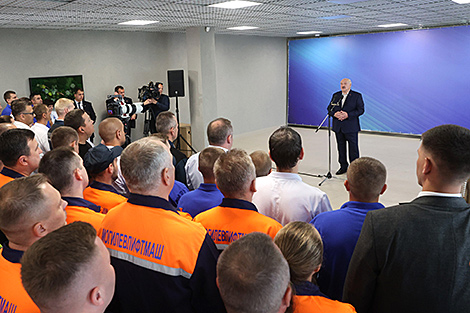
The work schedule of the Belarus president is always full of events. Aleksandr Lukashenko holds conferences and working meetings on the most topical matters concerning the country’s development, regularly visits the regions, goes on foreign trips and welcomes foreign guests, talks to reporters, signs decrees and laws. And even if there are no public events, it does not mean that the head of state does not work. It must be said that even when he relaxes, for instance, by playing ice hockey or chopping firewood, Aleksandr Lukashenko happens to find the time to give yet another instruction. All the decisions must be prompted by life, he likes to say.
The President’s Week project is intended for those, who want to keep up with the head of state, be up-to-date on the latest statements and decisions of the Belarusian leader.
Will Mogilev-made lifts raise the city’s economy to new heights? What signal did Aleksandr Lukashenko give to Soviet-style directors and why has Belarus stopped using U.S. dollars to limit annual increases in housing and utility rates? What did the president say about “palaces” as he visited an exemplary farm? Is it worth it to save money when money is in short supply? How are clover and sunflowers doing in the president’s experimental fields? What does the country intend to do to address the drought-affected cereal harvest?
The key purpose of the festival Slavianski Bazaar in Vitebsk in current troubled times, the story about how Belarus was close to losing this artistic forum. These and other details are in the latest episode of BelTA’s special project President’s Week.
LIFT FOR ECONOMY. Why does Aleksandr Lukashenko want “Soviet-style directors” tuned and what did he criticize while in Mogilev?
On 10 July Belarus President Aleksandr Lukashenko visited the Mogilev-based elevator manufacturing plant Mogilevliftmash.
The last time the head of state visited this enterprise was on 22 July 2016 during a working trip to Mogilev Oblast. Back then he noted that it is necessary to actively develop such enterprises as Mogilevliftmash. “The employment of people is the main concern for me but only on one condition: if they want to work. I am ready to do my best to provide jobs to those who want to work. Enough jobs and corresponding conditions have been created so far,” Aleksandr Lukashenko remarked.
In July 2020 the president authorized the appointment of Sergei Chertkov as Mogilevliftmash’s Director General. Until then Sergei Chertkov had been working as the company’s deputy director general for commerce. It is worth noting that Aleksandr Lukashenko knew Sergei Chertkov’s father – Valery Chertkov – very well. Back in the day Valery Chertkov ran the Mogilev-based transport machinery plant Mogilevtransmash and was the president of the Mogilev Association of Industrialists and Entrepreneurs. “He was a decent man. A true Belarusian. I would very much like you to work as well as he did,” Aleksandr Lukashenko told the new Mogilevliftmash head three years ago.
A window of opportunity
After that Aleksandr Lukashenko toured an exposition of modern elevators produced at the enterprise. The holding company also makes various modifications of electric motors as well as woodworking, agricultural, household appliances.
Mogilevliftmash is actively working on import substitution and is implementing relevant projects. The president was also informed that the enterprise is busy implementing several investment projects.
The head of state visited the production facilities at Mogilevliftmash, discussed the company’s development prospects, including plans to increase the output, expand the product range, and to use additional territories.
Aleksandr Lukashenko noted: “Why did I come to Mogilevliftmash (before that to BelAZ, MAZ)? Because the demand is great now. It is necessary to satisfy the market demand. Therefore, I have a question: why don’t we produce more while the demand is so high? If you lack capacities [at Mogilevliftmash], you need to use others if necessary. It is important for us not to miss the moment, to grab the market. If today we can sell 16,000 [units of products] while he [Mogilevliftmash] can produce 14,000, well, we have to move heaven and earth in order to make 2,000 more. Let the plant make the main parts while the Strommashina enterprise can bend, solder, weld things or something else. In this manner we will be able to occupy the market and help our enterprises operate at their full capacities.”
Aleksandr Lukashenko also mentioned it while talking to Mogilevliftmash workers. “The demand for your products is great. And not only for yours,” the head of state said.
He noted that the leadership of Russia, heads of the regions often talk about the demand for Belarusian products. “I’ve been hearing a lot recently from the elder brother, as I jokingly call them: ‘You did a good job by preserving this or that enterprise. You’ve managed to do it’…” The president noted it was not an easy job to preserve the enterprises and the worker collectives after the collapse of the Soviet Union.
The two countries are working together on import substitution, for example, in microelectronics. But the countries also need less sophisticated goods like buses or elevators.
The president said: “It is unavoidable. You make a product where you have to constantly fight and compete. This is why the oblast governor and I have agreed to motivate our executives, Soviet-style directors a bit to make them care about state interests. It will not always be like that.”
The need to put the city into order
Upon arrival at Mogilevliftmash the head of state drew attention to the need to put the city of Mogilev into order. He pointed out the relevant problems while flying on board a helicopter to the enterprise. “You are choking yourself with this bad housekeeping,” the president said.
Manufacturing premises or construction sites sometimes look untidy and lack order. The oblast administration and the city administration were instructed to see to these problems.
“Put things to rights. You should do it within a year. Mobilize people, put things in order,” the Belarusian leader demanded.
The State Control Committee confirms that the city has a number of problems.
“We are all loudly calling for cheaper food and so on. Okay, let it be. We are freezing prices. But you are ruining yourselves with this clutter. You are reducing your life span. All kinds of diseases can be found in it. You have taken to doing a weird thing: you dig out a foundation pit and dump waste in nearby bushes... These heaps of garbage and the rest are poisoning people,” Aleksandr Lukashenko emphasized.
The development of Mogilev Oblast
Mogilev Oblast Governor Anatoly Isachenko briefed the head of state on the main indicators of the region’s social and economic development. The growth rate of the gross regional product in Mogilev Oblast in January-May made up 98.6% as against the same period of last year.
“You have three failures in the oblast. The most surprising thing is that the region’s manufacturing sector is also underperforming,” Aleksandr Lukashenko noted.
Anatoly Isachenko clarified that the region cannot hit the GRP targets due to poor results in manufacturing, retail and wholesale trade. As far as manufacturing is concerned, there are issues in two industries - woodworking and cement production. They are to be resolved by the end of the year, some progress has already been made.
The president wondered about housing construction pace, about how troubles are addressed at the oblast’s largest enterprises, and about how investment projects are being implemented in the region.
A “daunting” project
Speaking about the realization of investment projects in the regions, Aleksandr Lukashenko stressed: “Keeping people busy is not the idea. We have almost no problems with this. The idea is to make sure that each district makes money for itself. And these projects they are launching should be more than just ticking off a box.”
“Each district has its own project. There are all kinds of projects. The work is in full swing,” the oblast governor replied. He cited the cultivation of rainbow trout in the southeast of Mogilev Oblast as a case in point. Every month the enterprise grows 20 tonnes of fish, these products are very popular in retail chains.
Aleksandr Lukashenko touched upon this topic as he met with representatives of Mogilevliftmash’s workforce: “You know my ‘daunting’ demand: each district has to set up a new high-tech enterprise by the end of this year or next year at the latest. Twenty-one districts [of Mogilev Oblast] means 21 new enterprises. Some progress has been made. We are helping with money. These projects need people and smart people at that. Therefore, we will need people. We will build enterprises. It is no longer a question today.”
Aleksandr Lukashenko had previously given an instruction to consider building the country’s second nitrogen complex and another pulp mill. The head of state was asked if it was possible to implement these projects at the local industry giant Mogilevkhimvolokno. According to the workers, the company has the necessary competencies and infrastructure.
“I would not want to oversaturate Mogilev with chemical facilities. Yet, if part of the above-mentioned production can be relocated to and developed at Mogilevkhimvolokno, we will go for it,” the president noted.
A new complex to manufacture nitrogen fertilizers was originally planned to be built in Vitebsk Oblast. But later on it was decided that it would make more sense to build it in Grodno, as the city has the necessary conditions and well-trained specialists. “I am not in favor of taking something out of somewhere and dragging it to Mogilev. There are many enterprises here. They need to be given a new lease on life. And if all people are employed, why would we need an extra enterprise here? I hope to god that we have enough workers today. There was unemployment back in the day, but today we need more and more people, because the market demands our products,” the head of state emphasized.
Correlation between discipline and war
The president mentioned the importance of maintaining discipline and of everyone doing their jobs properly.
Speaking about the company, Aleksandr Lukashenko said: “Today you have a young executive [Director General Sergei Chertkov]. He is local. He understands and knows what to do. You should also keep an eye on them and make sure your executives keep their guard up. Help them wherever you can. But discipline must be rock-solid.”
“No one demands anything extra. If you run a holding company, then you bear responsibility for it. For the plant, for the people. Everyone has a job to do. Welders, installers and other guys, accountants, economists. Everyone must do their jobs well and produce results. Discipline is important. Because lack of discipline is a failure. Failure means war. Everything starts with economy,” the Belarusian leader stressed.
Continuing the line of thought, the head of state cited the example of Ukraine, where the economy had not been doing well even before Russia’s special military operation. Thus, in addition to external causes, there are always internal causes. Aleksandr Lukashenko once again emphasized the responsibility of everyone for the stability and prosperity of the country: “No government is capable of solving all problems. Much depends on people themselves. These are how things are.”
Housing and utility rates and the refusal to calculate raises in “the enemy’s” currency
The questions asked by Mogilevliftmash workers included those concerning rates on housing and utility services. In June the growth of tariffs for housing and utility services was switched from U.S. dollars to the base amount. Now the maximum allowable increase in payments for public utility services cannot exceed 50% of the base amount instead of the previously established $5 equivalent. This is why Mogilevliftmash workers wondered whether this would result in higher utility costs, since today half of the base amount (Br18.5) is above $5 at the current exchange rate.
The head of state noted that the difference is negligible and there will certainly be no problems for employers to raise wages by this amount, especially at Mogilevliftmash.
“We should definitely compensate for this difference through a pay raise. We definitely have to increase salaries little by little,” Aleksandr Lukashenko emphasized. “We will try to move forward by raising salaries.”
At the same time, the president noted that households do not pay the full price for heat supply, but only 20-30% of the actual costs. The rest is paid by the state.
The president explained why this decision to unpeg housing and utility rates from the U.S. dollar had been made. “The dollar is an enemy currency for us. They left, blocked settlements in dollars for us, this is why we are switching to yuans, Russian rubles. We are okay with that,” he said.
“It all boils down to one thing: our prosperity depends on how we will work. We live quite well compared to what is happening around us. So don’t worry. We will lend a helping hand if things get tough,” Aleksandr Lukashenko emphasized.
Broadband Internet access in the countryside
A Mogilevliftmash worker wondered about the development of infrastructure in the countryside, including quality access to the Internet.
Aleksandr Lukashenko confirmed plans to enable broadband Internet access in the countryside by 2025. “We have a plan to settle this issue in 2025. We must solve this problem. We are not lagging behind the world. We will get most of this job done,” the Belarusian leader said.
At the same time, the head of state pointed out that it is important to teach people how to use the Internet safely. After all, in capable hands the Internet can actually become a weapon that is used, among other things, for destructive influence on society like it happened in Belarus in 2020. “Look at the present day. If we hadn’t survived then, we wouldn’t have existed as a country today. They would have dealt with us long ago without war. NATO troops would have been stationed in close proximity to Smolensk,” the president said.
“It is unavoidable. People need access to the Internet, and we should tell them how to use it. Internet is a great thing, yet it’s also a giant garbage dump,” Aleksandr Lukashenko said.
SHOWING OFF IS NOT THE KEY. What instructions did the president give as he visited an exemplary farm?
On 11 July Aleksandr Lukashenko went on a working trip to Orsha District, Vitebsk Oblast. The head of state visited the robotized dairy complex Pavlinka of the agricultural company Yubileiny.
The dairy complex is designed to accommodate 2,400 head of cattle. As many as 2,240 head of state are kept there now. The complex uses milking robots. The facility was commissioned in June 2021. The total cost of four stages of the project’s implementation was Br71.5 million.
Certainly, it is not the cheapest complex. Aleksandr Lukashenko drew attention to this fact. According to him, if the agricultural company can afford it, no one forbids building such farms, but a few years ago he gave an instruction to work out a dairy complex design with the optimal price and quality parameters that can be used throughout the country.
The head of state cited the Rodina farm in Belynichi District as a case in point and recalled its executive Lapotentov. “There was no showing off, and the company operates at a profit,” he remarked.
“I want us to build optimal complexes,” the president said as he was speaking about approaches to building livestock complexes in the country as a whole.
“Our task is to phase out these prehistoric farms over the next five years. We need to build advanced facilities, but they should be cheap (not grand complexes like this). We need to revisit the price issue. We need to calculate how much such a complex will cost,” Aleksandr Lukashenko said. “We get 25% of milk from these farms. All the cows should be transferred to such complexes. We need to determine an optimal price for an optimal complex. I am not saying that it should be cheap or expensive. The miser pays twice. Yet, we have no extra money. During the next five-year period the entire dairy herd should be transferred to technologically advanced complexes.”
The state of affairs in animal husbandry industry
Agriculture and Food Minister Igor Brylo reported on the situation in agriculture, with a focus on the livestock sector. According to him, milk output in Belarus is growing and the dynamics will increase. Meat output is also on the rise in all regions.
First of all, the president wanted to know how problems are being dealt with.
“First. I receive complaints that you have banned farms from selling dry cows that have not been milked for two or three years. Why are you doing this? Why do you keep dry cows in order to inflate herd figures?” Aleksandr Lukashenko asked.
Deputy Prime Minister Leonid Zayats assured that such cases are few. If such things happened, their number was insignificant and these decisions are made at the local level, Igor Brylo added.
“Okay, we will sort it out. God forbid if we detect at least one such case. This is unacceptable,” the head of state stressed.
He also wondered about the loss of livestock.
“Over the six months we reduced the non-productive loss of cattle by 21,000 or 76%. The cattle mortality accounted for 48% of the deadstock (down by 3.4% year-on-year). The slaughter (which is another form of non-productive cattle loss) in the farms went down by 13,000,” the minister said.
“And what is the acceptable mortality rate in your opinion?” Aleksandr Lukashenko asked.
According to Igor Brylo, technological losses should be 1.7%. The actual losses are 1.4%, down by 0.1% year-on-year.
“Well, in this case you deserve a medal,” the president noted.
“Let’s say it is too early to give medals to Gomel Oblast. It is too early for Mogilev Oblast. I mean there is still work to do there. But the downward trend will continue,” the minister said.
Harvest projections amid the drought
During the working trip the agriculture and food minister also informed the president that on the whole, this year’s harvest of cereals and leguminous crops will be quite good. Naturally, considering the complicated weather conditions relating to the drought. A sufficient amount of cereals is expected to be harvested. Government purchase contracts will be fulfilled. Apart from that, there are leftovers from last year. But in order to ensure the stable operation of the animal husbandry industry, it is necessary to import comparatively small amounts of cereals from Russia. There are plans to import 0.5 million tonnes at present.
The head of state noted that the situation on the market seems to be good for purchases, this is why it is necessary to act. “You have to buy as long as it is cheap. And even if imported grain is somewhere close to the prime cost, you have to import it and store it if storage capacities are available. It is as good as the gold and foreign exchange reserves. We can always use cereals,” Aleksandr Lukashenko said.
The president was also told that nearly half of the winter barley crops had been harvested. The results are quite good even despite the drought. The head of state once again mentioned the decision in favor of growing this crop had been the right one.
Sunflower farming was also mentioned. Aleksandr Lukashenko had personally examined the state of the fields sown with these crops earlier: “I saw this kind of sunflowers only in Ukraine as a kid. It is growing excellently. We could use it as silage if forage was in short supply. It is higher than I am. We have to find out why [the sunflowers] are so high despite the drought.”
The head of state was also informed about the state of crops and other agricultural crops.
Red tape and foot dragging
Director of the agricultural company Yubileiny Aleksandr Firsin informed the head of state about plans to build new complexes. He drew attention to the problem of the lengthy approval of design documents. “It is impossible to build at all. I make the design documents for three months and it takes four months to get them approved,” the executive said.
“Build the way you believe it is necessary. I’ve told you a thousand times: cut out this red tape,” the president told the deputy prime minister. “These issues must be fixed today. You will bear responsibility for foot dragging. We’ve made a decision on housing: people are free to build private homes in a village or a city any way they want. I tell him now: go ahead and build it the way you believe it is necessary. If he is not ready psychologically, he should say what he needs. Tomorrow you have to pour concrete to build the foundation and proceed with construction.”
Chinese sweets
Aleksandr Lukashenko urged the officials responsible for agribusiness to export primarily ready-made products instead of raw materials or semi-finished products. “You have to work now and think,” he said.
A certain amount of milk powder in storage was mentioned as an example. The officials in charge of agribusiness assured the president that they expect to sell these amounts soon and that the situation does not cause concerns.
In response Aleksandr Lukashenko gave an example of a milk powder product made in China: “They buy milk powder. And they press it into a candy form. Why don’t we do it?”
Then they add honey or other filling agents to such sweets and thus make a tasty, inexpensive and healthy product which is very popular in the Chinese market. Aleksandr Lukashenko is sure that such sweets, which he himself had tasted, could be to the liking of Belarusians and residents of other countries.
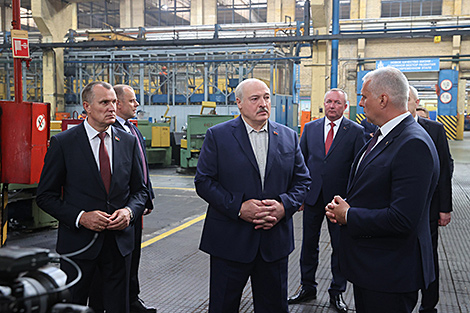
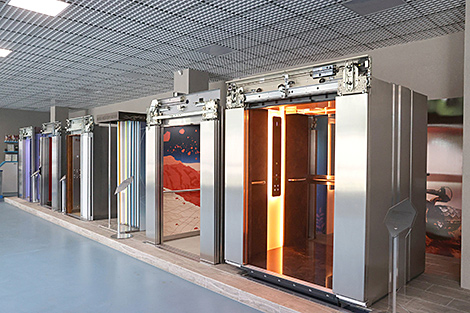
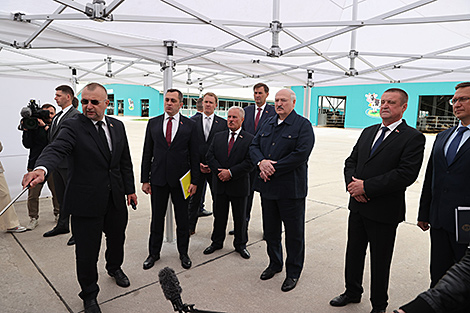
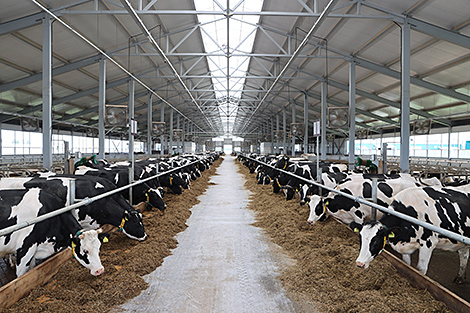
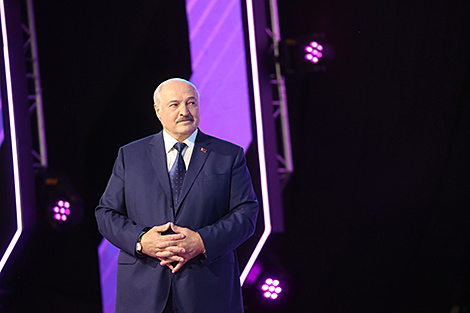
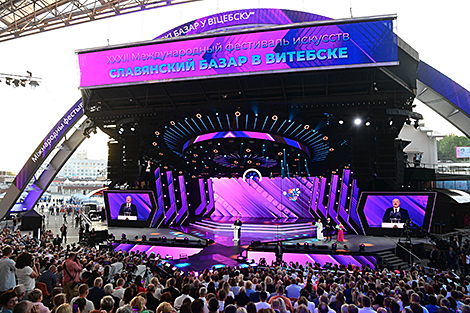
FROM CLOVER TO SUNFLOWERS. What is the state of the president’s experimental fields?
On 12 July Aleksandr Lukashenko inspected experimental fields in the area where he grew up. The head of state mentioned the intention to visit those presidential experimental fields during a tour of the robotized dairy complex Pavlinka in Orsha District the day before.
A lot of crop varieties grow in the presidential experimental fields: clover, different varieties of wheat, soybeans, lupine, feed peas, spring barley, triticale, and sunflowers. They are the key experiment today.
“Yes, the crops are maturing well,” Aleksandr Lukashenko evaluated the state of the crops.
The head of state remarked that soils are less fertile along the road due to understandable reasons and the crops have been affected by that. But the yield will be much better deeper into the field.
“We cannot use chemicals here because we will ruin clover otherwise,” the president explained. In his words, more attention will be paid to this plant in the future.
Aleksandr Lukashenko reminded that these fields had been used back in the day for experimenting with rapeseed and winter barley. The results demonstrated practical benefits and effectiveness of growing these crops, in particular, financial one.
TO KEEP THE BAZAAR GOING. Who helped keep the festival Slavianski Bazaar in Vitebsk in Belarus?
Aleksandr Lukashenko traditionally attends the opening ceremony of the art festival Slavianski Bazaar in Vitebsk. He did the same this year. On 13 July. For a third of a century already the festival has been making the beautiful city upon the Dvina River a center of attraction for genuine talents and true connoisseurs of art.
“We, Belarusians don’t call Vitebsk a cultural capital for the sake of pathos. This status is predetermined by history. Both thousand years ago when the route from Varangians to the Greek crossed the place and today the city was and remains a crossroads of national cultures and traditions of different nations. The rhythm of creative ideas and concepts has always beaten strong here,” Aleksandr Lukashenko said.
The president reminded that innovative forms of art were created in workshops of Malevich, Chagall, and other vanguard painters at the beginning of the 20th century. They are now recognized as the world classics. At present the Vitebsk land has become the native place for massive art festivals, contests, national and international forums. It is here that new traditions are born, new talents are uncovered, and the history of modern art is written.
“This history is being written by you – our beloved artists, painters, composers, poets, and folk craftsmen. From the bottom of my heart I thank everyone, who gifts a piece of their soul to our festival. We hear it in songs. We see it in theatrical performances, dance routines, and street performances, in unique decorative goods. All of us – participants, organizers, guests – create a wonderful atmosphere of genuine, true art here that unites nations and states. The art that is splendid in its national identity. The art that is truly high and always rises above political games and intrigues,” the Belarusian leader stressed.
Slavonic unity
Aleksandr Lukashenko said: “The motto of the festival ‘Through art to peace and mutual understanding’ has never been more relevant than it is today. Slavonic unity, the unity of all sensible people is once again being put to the test. But here, in Vitebsk year after year we see how it is getting stronger. And the number of our friends grows larger. Artists from the remotest parts of the planet perform on this stage. By coming to us, they say no to all the artificially created barriers between nations and countries, to all the enforced stereotypes and opinions about our countries.”
The president said: “Year after year, as we gather under the dome of the Vitebsk amphitheater we create peace together. Belarusians and Russians. And I am confident there are plenty of Ukrainians here. And our guests. We create peace! And it is the key mission of Slavianski Bazaar.”
Well-deserved awards for a handful of individuals
The festival takes place under the patronage of the Belarus president and the president has a role to play during the festival. “I highly appreciate my right to present well-deserved awards on this stage,” the Belarusian leader noted. This year Aleksandr Lukashenko presented the grand prix of the 21st international children’s music contest Vitebsk to the young Kazakh performer Sherkhan Arystan. During the festival’s opening ceremony the head of state also presented a special prize “Through art to peace and mutual understanding” to the Honored Artist of Belarus and the irreplaceable hostess of the Slavianski Bazaar in Vitebsk Yelena Spiridovich.
Aleksandr Lukashenko went on saying: “Just like in previous years today we honor those, who are taking their first career steps, and established names. We appreciate experience and contributions to the development of Belarusian culture. We see new talents and help them start their careers. To a degree this ceremony reflects the essence of the policy of our countries based on principles of the continuity of ages and generations. We, Belarusians feel deep respect for predecessors, on whose shoulders we rely as we strengthen and develop our statehood. And we do everything to become a reliable pillar for children and grandchildren. We have always been an island of security and a reliable pillar for all peace-loving people. Trust me, Belarus will always be like that.”
The head of state recalled the history of the festival at the beginning of his presidency: “I remember my first steps onto this stage. Back then I was feeling some… You know what a person feels when they come out in front of a huge audience. There are 7,000 people here [in the Summer Amphitheater] and millions are watching. As usual, I approached our prominent hosts. And some young girl (she is an adult today) was trying to overload me with information because she understood that it would be difficult to meet with the president, particularly back then. I didn’t listen to everything she said. And I remembered Yelena saying: ‘Aleksandr Grigoryevich [Lukashenko], please, save Slavianski Bazaar’.”
The head of state noted that times were complicated back then. Not even because the Soviet Union had collapsed or money had been in short supply or something else. “The thing is various dealers came forth and tried to disperse this Slavianski Bazaar across cities and towns. Only a handful of people, including Yelena, felt that it would destroy the festival. I realized all of it after I came back after this first festival.”
The president stressed he had not recalled the event in order to emphasize his role: “It is emphasized enough. What I did or didn’t do, bad things or good things. It is all on you. It is the fate of presidents. But I’d like to emphasize that there were only a few people… Three, maybe four, maybe five people, whose souls were welded to our festival. They latched onto the festival and were asking everyone they could to save the festival.”
“We’ve presented this prize [to Yelena Spiridovich] for a reason. It may be a bit late. We sometimes presented these prizes to people, who are on the other side of the barricades now. It is life. All things may happen. But we presented these prizes in recognition of the art that these people had gifted to us and to these organizers. This is why there is no need to be modest, Yelena. You deserve this award. And all of those, who stood up back then (several people next to you), those, who were saving this bazaar, have to understand that it is also their award. No offense, please. An award of the very few people,” Aleksandr Lukashenko added.
He wished for the history of the Slavianski Bazaar in Vitebsk and of Belarus to be eternal. He wished for the best tunes and voices of not only Belarusian performers but those from Russia, Ukraine, neighboring Slavonic countries, and many other nations to always be heard on the stage of the festival. The president also wished for peace and creation to remain the key goals of modern generations and future ones.







 print version
print version make home page
make home page add to bookmarks
add to bookmarks

